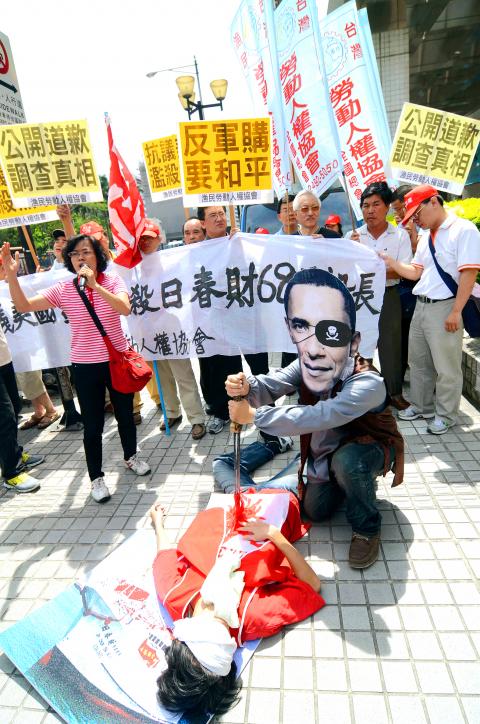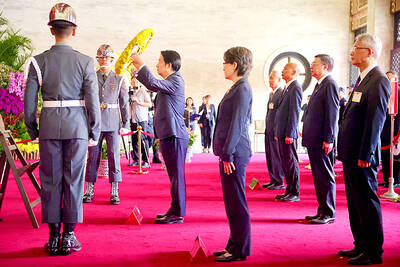A small group of people protested in front of the American Institute in Taiwan (AIT) yesterday, demanding that the truth about the death of a Taiwanese ship captain during a firefight between a US Navy ship and Somali pirates be made public and that the US compensate the captain’s family.
Wu Lai-yu (吳來于), captain of the Jih Chun Tsai No. 68, which was hijacked by pirates off the coast of Somalia in March last year and was used as a mothership, died on May 10 during a NATO anti-piracy mission carried out by the USS Stephen W. Groves.
Washington has yet to account for how the gunfight began and how Wu was killed, only saying that a team from the US warship found Wu and three pirates dead when it boarded the vessel. The US also confirmed that Wu was buried at sea.

Photo: Wang Yi-sung, Taipei Times
Dozens of protesters representing the Human Rights Association for Taiwan Fishermen, the Labor Party and the Chung Hwa Baodiao Alliance protested to condemn the US for “killing the captain” and “destroying the corpse and obliterating the evidence.”
“The US hasn’t offered an apology, nor has it made any mention of compensation, which is why we are here today,” Labor Party -Secretary-General Tang Shu (唐曙) said.
Tang said Wu “was not killed by mistake,” but that it was a case of “an innocent civilian -slaughtered” by the US Navy, an act Tang said was “in violation of the principles for humanitarian rescue operations.”
“It’s outrageous that the US brazenly killed a hostage in international waters,” Tang said.
The protesters demanded the US publicly apologize to Wu’s family, provide compensation for losses — including Wu’s death and the sinking of the ship — and that the US allow Taiwanese officials to participate in an investigation into the accident.
A final request was that the US urge Japan to grant Taiwanese fishing rights in the disputed Diaoyutai Islands (釣魚台).
“It was because Japan prevented Taiwanese fishermen from operating in the waters surrounding the Diaoyutai Islands that Wu had sailed a long way to dangerous waters off eastern Africa to earn a living,” Human Rights Association for Taiwan Fishermen director Hsiao Wen-yi (蕭文義) said.
US support for Japan’s claim to the Diaoyutai Islands and the inclusion of the disputed waters in the Treaty of Mutual Cooperation and Security between the US and Japan has resulted in Japan’s arbitrary denial of Taiwanese fishermen’s right to operate there, Hsiao said.
The protest lasted about an hour, with demonstrators chanting slogans and delivering statements to AIT spokesperson Sheila Paskman, who came out to receive them.
Talking to representatives of the groups, Paskman said the AIT was aware that the matter was important and needed to be resolved.
Paskman said the AIT would contact the Ministry of Foreign Affairs as soon as it obtained new information about the incident from the US government.
Ecoterra International, an international NGO, said that on April 24, the USS Stephen W. Groves, operating as part of NATO’s counter-piracy mission, had fired upon and destroyed two unmanned pirate skiffs towed by the Jih Chun Tsai No. 68 while it was attached to the hijacked Italian bulker Rosalia’s Amato.
The military action by the US Navy has been described by Ecoterro as an “ill-conceived” and “botched” naval attack because it “endangered hostages in the first place” and was not followed by legal procedures to try the surviving pirates, whom NATO said in a statement have been returned to Somalia.
Also cast into doubt by Ecoterro was whether the US Navy was authorized to attack the pirate convoy.
“While trying to get information if the US naval attack against this pirated convoy was authorized by the vessel owner and/or the Italian government, we received first reports which clearly indicate that neither the Italian government nor the vessel owner had authorized any military action and as a matter of fact the navies were only requested to observe the vessel while it was commandeered to Somalia. Apparently the navies and especially NATO have been given firm instructions to stand down and to not wage any military action,” Ecoterro reported on May 20.
In an e-mail reply to the Taipei Times regarding the operation, AIT spokesperson Christopher Kavanagh said: “All at-sea counter-piracy engagements are designed to avoid casualties. We do not, however, discuss the details of specific counter-piracy operations.”
“Under international law, all states, including the United States, have a duty to cooperate in repressing piracy. Generally, a warship has the right under international law to board any vessel reasonably suspected of engaging in piracy,” Kavanagh said.
He said the US Department of Defense was undergoing a “factual review” of the circumstances surrounding Wu’s death.
The AIT provided some additional information about the Jih Chun Tsai No. 68 and Wu to the ministry over the weekend, he said.
“As we receive more details, we will share them with the Ministry of Foreign Affairs,” he said.
Bruce Linghu (令狐榮達), the director-general of the ministry’s Department of North American Affairs, confirmed to the Taipei Times that the AIT had provided more information to the ministry, but that it was not a final investigation report.

RESPONSE: The transit sends a message that China’s alignment with other countries would not deter the West from defending freedom of navigation, an academic said Canadian frigate the Ville de Quebec and Australian guided-missile destroyer the Brisbane transited the Taiwan Strait yesterday morning, the first time the two nations have conducted a joint freedom of navigation operation. The Canadian and Australian militaries did not immediately respond to requests for comment. The Ministry of National Defense declined to confirm the passage, saying only that Taiwan’s armed forces had deployed surveillance and reconnaissance assets, along with warships and combat aircraft, to safeguard security across the Strait. The two vessels were observed transiting northward along the eastern side of the Taiwan Strait’s median line, with Japan being their most likely destination,

‘NOT ALONE’: A Taiwan Strait war would disrupt global trade routes, and could spark a worldwide crisis, so a powerful US presence is needed as a deterrence, a US senator said US Senator Deb Fischer on Thursday urged her colleagues in the US Congress to deepen Washington’s cooperation with Taiwan and other Indo-Pacific partners to contain the global security threat from China. Fischer and other lawmakers recently returned from an official trip to the Indo-Pacific region, where they toured US military bases in Hawaii and Guam, and visited leaders, including President William Lai (賴清德). The trip underscored the reality that the world is undergoing turmoil, and maintaining a free and open Indo-Pacific region is crucial to the security interests of the US and its partners, she said. Her visit to Taiwan demonstrated ways the

GLOBAL ISSUE: If China annexes Taiwan, ‘it will not stop its expansion there, as it only becomes stronger and has more force to expand further,’ the president said China’s military and diplomatic expansion is not a sole issue for Taiwan, but one that risks world peace, President William Lai (賴清德) said yesterday, adding that Taiwan would stand with the alliance of democratic countries to preserve peace through deterrence. Lai made the remark in an exclusive interview with the Chinese-language Liberty Times (sister paper of the Taipei Times). “China is strategically pushing forward to change the international order,” Lai said, adding that China established the Asia Infrastructure Investment Bank, launched the Belt and Road Initiative, and pushed for yuan internationalization, because it wants to replace the democratic rules-based international

WAR’S END ANNIVERSARY: ‘Taiwan does not believe in commemorating peace by holding guns,’ the president said on social media after attending a morning ceremony Countries should uphold peace, and promote freedom and democracy, President William Lai (賴清德) said yesterday as Taiwan marked 80 years since the end of World War II and the Second Sino-Japanese War. Lai, Vice President Hsiao Bi-khim (蕭美琴) and other top officials in the morning attended a ceremony at the National Revolutionary Martyrs’ Shrine in Taipei’s Zhongshan District (中山) to honor those who sacrificed their lives in major battles. “Taiwanese are peace-loving. Taiwan does not believe in commemorating peace by holding guns,” Lai wrote on Facebook afterward, apparently to highlight the contrast with the military parade in Beijing marking the same anniversary. “We